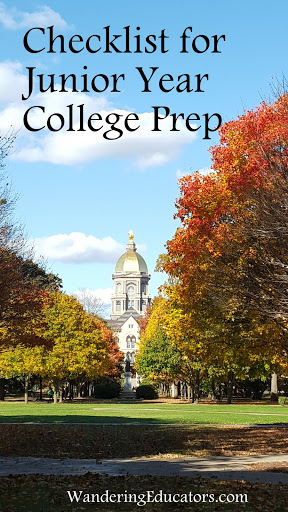Being the first person to go to college in my family, I really felt lost when approaching plans for college. My high school guidance counselor wasn’t really much of a help and I relied more on the parents of my friends who did attend college for more information and advice. Looking back, I see so much that I should’ve or could’ve done, but it didn’t turn out too bad. A Bachelors and a Masters later, I gained a lot of skills and experience through having nine internships, a study abroad experience, volunteer experiences, and working part-time and full-time during college. My brother George is going to be starting his junior year of high school and we’ve been talking about college a lot. I live in Michigan and my family lives in Pennsylvania so it’s hard to “be there” when I’m a few states away. Nevertheless, it got me thinking about creating a checklist for someone who will be starting their junior year of high school and the steps we’re talking about. Note: this list is not in any particular order but is more of a guide to help someone who is contemplating the idea of attending college.

Checklist for Junior Year College Prep:
Take a look at potential majors and careers of interest by viewing college catalogs and looking at what colleges and universities offer. Create a list of potential majors and careers on a sheet of paper that interest you and continue to research about them.
Know the difference between a public and private college or university. (There’s a big difference financially!) Also know the difference between in-state and out-of-state schools and cost implications. If money is a major factor for your college education, definitely consider community colleges. You can get your general education requirements out of the way or earn an Associate’s degree or certificate in a field of interest!
College Tour. Create a list of schools that you’d like to visit—this will be part of your “college tour” and is a great way to spend a day at a college or university that interests you. The college tour usually includes a tour of the campus, residence halls (will you be commuting to campus? This is a $$ saver!), having lunch at one of the on-campus eateries, touring the department where you will earn a degree, talking with faculty and staff, and students too (the students are usually the people giving the tours). *Tip: go with questions to ask and get to know each campus. Ask yourself, can you see yourself there? Create another list with columns that compare & contrast cost of tuition and fees, will you be staying on-campus in a residence hall (yes or no), do they have the program you are interested in, do they have clubs and extracurricular programs that interest you (being involved is key!), size, location, etc. Even sit-in on a class while on your college tour.

Most colleges and universities require you to take your SAT or ACT. It’s a good idea to take these standardized tests more than once, so give a trial run during your junior year so you’ll know what to expect. There’s plenty of SAT or ACT-prep books and even classes to help high school students to prepare. Don’t get too upset if you don’t do as well as you had hoped. You can take the test again and colleges and universities will take your higher score. I took my SATs twice and increased my score by 100 points. It’s definitely worth it to take a few times. *Tip: Check out libraries for instructional prep books—they also carry practice exams and test-taking tactics that will increase your test scores.
Check in with your high school guidance counselors. They can answer some important questions you may have, as well as college catalogs you can browse through. Guidance counselors will also have a checklist for juniors in high school to keep them organized about prepping for college. Some counselors will even create college-prep workshops for juniors and seniors, which are super helpful.
Keep your grades up. Many students get admitted into college before they’re even a senior in high school. A lot of students think they have one more year left to bump up their grades but many college decisions will be made by the fall of your senior year — which means your junior year of college is very important — so keep up your grades and get involved. A “well-rounded” student is something that many college admissions officers will be looking at on applications. If you’re a part of sports, clubs, and activities, good! *Tip: as you’re applying to colleges…apply to several colleges. Never put all of your eggs in one basket. It’s always good to have options.
If you can take AP classes, do it! AP classes will earn you college credit. Many first-year college courses can be waived if you pass AP classes and tests. Most of these courses are in English, Math, and Science.

Look into scholarships and grants! Scholarships.com, fastweb.com, and asking about scholarships and grants on your college tour at the financial aid office will get you a good start. If you’re part of a sport, you can play an intramural sport and that can grant you a large tuition discount. If you play an instrument, consider playing for the band at your college—another tuition discount. Look for money anywhere you can, because college can be very expensive. Talk to your guidance counselor about this, as well.
Do further research on the internet about how to prepare for college. Involve your parents and siblings - it can definitely be a family affair. As a first-generation college graduate, having the support of my family was one of the keys to my success. Remember that it’s OK to not know what you want to do right away. It’s normal for students to change their majors multiple times and even transfer colleges. Preparing for college can save you a lot of time and money by investing in yourself as you prepare for your future. Ask questions, get involved, and start asking yourself what will make you happy vocationally, because what you choose may be your career for 30+ years. Only you can make that decision and it’s one that takes time. A book I recommend reading is Getting from College to Career 90 Things to do Before you Join the Real World by Lindsay Pollak. It is an excellent book and will keep you on-par for what you need to be doing once you’re in college.
Enjoy your junior year of high school. It can be a lot of fun learning more about yourself and your interests, touring colleges, and figuring things out. Don’t get overwhelmed.
My college years were some of the best years of my life! Other articles in the College Prep Series:
TV Dad Alan Thicke Offers College Road Trip Advice
Anastasia R.D. Lopez, M.A. recently graduated with her Masters degree in Educational Leadership in Higher Education and Student Affairs degree from Western Michigan University. She earned her Bachelor of Science in Business Administration degree in Hospitality and Tourism Management from Robert Morris University. Her experience in higher education and student affairs ranges from Career Services, Academic Advising, working with first generation students, students with disabilities, international students, transfer students, undergraduate/graduate students, and study abroad and international education at both public and private universities. She also has related experience in business as well as hospitality and tourism management. Stasia is a Global Education Editor with Wandering Educators and lives with her husband, Fernando, in Michigan.
All photos courtesy and copyright Stasia Lopez
